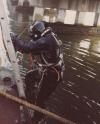|
|

|
Greg - 2/26/2013 9:21 AM 
EskimoBluDay...it’s funny you bring this up. I was just speaking about this with another DB member. If you dive with a less experienced diver, you might end up watching them more than you do yourself or the environment. So I agree that it’s just as important to be proficient with diving solo. That way if both divers are prepared for solo diving, then that makes the dive that much safer.
On the same subject, if your dive buddy gets into trouble, do not put yourself in trouble trying to help them. You can not provide support if you become endangered yourself. So take a few seconds to think about the situation before reacting. Provide assistance, but only if you are safe first.
|
|

|
I think the article also concluded that approximately 40% of the fatalities occured during periods where the buddy teams were seperated.
|
|

|
Greg - 2/27/2013 8:37 AM 
Technology should evolve in the scuba industry to help avoid buoyancy and air supply problems.
I predict a future of BCs that provide semi-automated buoyancy control based on your body makeup and water depth. Sort of like the "lane assist" feature in some modern cars. The BC wouldn’t be fully automated, but it could help make slight adjustments to keep you steady.
And computers/regulators that manage the air supply to help prevent from low/out-of-air situations. Maybe the reg can release some nasty tasting air once you get too low, which would encourage you to finish the dive :) Or a computer that starts to vibrate erratically and doesn’t stop until you ascend. Or maybe the buddy sharing dive computers will become standard so you can see your buddy’s air also.
|
|

|
Sadly, many dive shops do not enforce many of the text book recommendation. I dove the Vandenberg at Key West, some of the divers in my group just receive their Open Water cert a few days ago and the dive master/guide let them dive Vandenberg anyway, especially with current down at 90ft.
When I was in Malaysia, the dive master wouldn’t let me go below 18 meter when I didn’t have my Advance. Yes I was disappointed, but it made me more determine to get the Advance cert!
|
|

|
I was talking to other people about this same study and could not find out if there was any indication of the types of dives these people were making. Is there any way to get a hold of the raw data that was used for the study?
|
|

|
Greg - 3/04/2013 7:37 AM 
The Divers Alert Network conducted the study. They may release the data, you would just have to ask them. They are a non profit so chances are good that they would provide the data.
|
|

|
re buddy vs Solo : I try to teach my students "Be there doe your buddy, don’t expect them to be there for you"
|
|